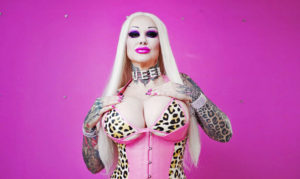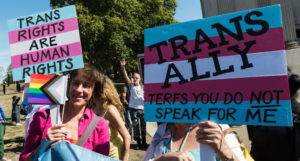The phrase “I’m exhausted” has been nagging at me. You hear it often from woke activists in their twenties or thirties. “I’m a privileged White cis gender woman and *I’m* fucking exhausted by the amount of Trans-hate I encounter daily”, says one.
Disney is exhausted too, in the wake of the backlash that followed revelations of a the company’s commitment to having 50% of story leads be sexual or racial minorities: “I know I’m preaching to the choir but as a Disney employee I am just. exhausted”, says director Sam King.
“I’m exhausted” feels to me like a stand-in for actual emotions. Either of the individuals quoted above might be angry, saddened, resentful, disgusted, all of the above or perhaps some other strong feeling. Instead, “exhausted” takes its place.
It puts me in mind of something I see often among parents of young children, when their offspring are acting up. A small child is snatching, defiant or throwing a tantrum; the parent’s response is “Oh, s/he’s tired”.
When you’re the parent in charge of a toddler that’s acting up, telling others around “Oh, she’s tired” in practice serves as much to excuse your own parenting as the child’s behaviour. It may also be true, of course. But what does it tell a child, if we give them the consistent message that strong negative emotions are not ‘theirs’ but simply byproducts of external factors, such as being ‘tired’, and that they bear no responsibility for anything they do under the influence of these external factors?
I think we may be finding out. For we’re seeing an increasingly prominent role played in our public discourse by the adult version of the “she’s tired” trump card: trauma.
Just as a badly-behaved toddler may really be tired, it is, of course, important to recognise that trauma is real and can mark people’s psyches deeply. But it’s not that long since the only context in which people talked about ‘trauma’ was veterans of war. And yet recently the US journalist and purveyor of politically slanted pile-on reporting, Taylor Lorenz, described the “severe PTSD” she experienced as a result of the hostility she inspires online.
This came hot on the heels of the writer Laurie Penny responding to the not entirely positive reception her recent book received, by describing “rolling panic attacks, bone-tired, confused and constantly cold in a way I’ve only experienced before in the immediacy of deep grief”. Was it Covid-19? She wondered. “Nope, just CPTSD.”
In this context, I was struck by the heavy use of trauma-related language in the recent announcement by Bridgend MP Jamie Wallis that he intended to come out as transgender. Wallis has, reportedly, been having “a tough time” necessitating the “support” of his party’s Whips — not in their usual role in keeping MPs in line but in their “important wellbeing role”. “I am not OK”, he says.
Wallis refers to several traumatic incidents including being blackmailed, raped and crashing a car into a lamp-post. (Reports at the time indicated the MP was suspected of “driving while unfit”.) And mixed in with these are statements from Wallis of having been “diagnosed with gender dysphoria” and feeling “this way since I was a very young child”.
The main focus in the press has been on the latter announcement, reported straightforwardly as Wallis coming out as transgender. But, on closer inspection, the declaration is more than a little odd, bearing an echo of St Augustine’s famous plea “Please, God, make me good, but not yet”. “I’m trans,” Wallis declares. “Or rather, I want to be.”
That is, not so much announcing a transgender identity, as declaring a desire to do so. Elsewhere, Wallis has indicated that he’s not planning to change appearance or pronouns at present.
Is Wallis really trans, on his way to being trans, or something else? That is, I suggest, not a useful rabbit-hole to go down. There are no biomarkers for a trans identity, meaning there’s no test that will reliably determine whether someone is really trans in an objectively measurable way. (Nor is there any metaphysical consensus, in the radioactive public discourse about trans identities, on what really trans could mean.) Given this, you’re either down with the radical subjectivism the condition implies — or you aren’t.
But while politicians need to be careful about speculating on others’ inner lives, the online peanut gallery is of the view that radical subjectivism is precisely the point — at least where Jamie Wallis MP is concerned.
Here, in contrast to uniform public applause, we find widespread cynicism about the authenticity of Wallis’s declared identity, the purity of his motives in making the announcement, and the laudability of his character in general.
For in the context of our contemporary culture, despite how radically subjective transgender identity is, it is common to refer to people who claim it, as Keir Starmer did last year, as “among the most marginalised”. As a group, they’re commonly referred to as at special risk of trauma. It is understood to follow from this that such individuals are, therefore, in need of compensatory kindness and latitude wherever possible.
Such kindness and latitude has been forthcoming in spades since Wallis’s announcement – at least from the press and politicians across the House, who were quick to make warm and welcoming noises about it. Boris Johnson declared “We will support you to live freely as yourself”.
And there are reasons to think Wallis might be in need of “support” to “live freely”. For the consequences of his free living over the last two years have seen him repeatedly at the sharp end of hostile scrutiny, on several occasions, in ways that might well be (in the Taylor Lorenz sense) traumatic.
A year ago, for example, Labour MP Tonia Antoniazzi demanded that Wallis apologise for involvement in a “sugar daddy” dating website she called “exploitative and demeaning”. Wallis denied any involvement in this business, but Ms Antoniazzi claimed to have information from a former employee that contradicted this statement.
And once journalists began rummaging in Wallis’s portfolio as an online entrepreneur, other stories began to surface as well. Buzzfeed reported that online firms in which Wallis was involved had been the subject of hundreds of complaints to trading standards. Subject to the tabloid magnifying-glass for more than two years, then, perhaps it’s no wonder that Jamie Wallis is “not ok”.
I am less cynical than the internet’s Greek chorus, many of whom seem to suggest that Wallis’s announcement is issued in bad faith. I don’t think this is the case; rather, I think it perfectly plausible that he believes every word of it. There’s no reason to imagine hostile tabloid scrutiny, blackmail, a hookup gone horribly wrong and a car crash that resulted in arrest would be anything other than cumulatively very upsetting.
But it’s also legitimate to ask: does being upset by a series of events release you from any condemnation for the events themselves? And it’s striking how often “trauma” and related forms of emotional distress occur in close proximity, in contemporary discourse, to behaviour others might look askance at.
This weekend, the writer Katherine Ormerod explained her decision to go on holiday without her 10-week-old baby — something many in the age of “attachment parenting” would consider a complete no-no — by telling the reader “It had been a traumatic time”. Just yesterday, Tory MP David Warburton was admitted to hospital with “shock and stress” after a parliamentary investigation was opened into his behaviour.
And in his statement, Wallis says “When I crashed my car on the 28th November I fled the scene. I did so because I was terrified. I have PTSD and I honestly have no idea what I was doing except I was overcome by an overwhelming sense of fear.”
We may feel empathy for those who experience their inner life as being at odds with what the rest of the world sees — at least in the context of a trans identity. But how far should that empathy extend, if the gap between inner life and what the rest of the world sees comprises actions that would be widely seen as worthy of condemnation? And certainly, for many, “driving while unfit” then fleeing the scene of the resulting crash would qualify as “worthy of condemnation”.
I would be the last to advocate a wholly harsh and pitiless public life. It is good and right to include a measure of empathy in how we assess public figures. But if we accept a politics that is all empathy, we may end up creating one that is pitiless in another way.
For what such a world gains in compassion, it risks losing in justice. In 2018, Taylor Lorenz turbo-charged her move out of digital into journalism by “outing” two anonymous social media stars, the Oshry sisters, as daughters of a notorious far-Right commentator, which resulted in their TV talk show being cancelled. In other words, it is safe to say she has no objections to online pile-ons as such, just to having them directed at herself.
A world in which Taylor Lorenz is an unambiguous figure of sympathy is a radically subjective one, in which only the self-declared metric of personal trauma determines how we weigh the severity of wrongdoing. A world in which there is no responsibility for actions, except the “accountability” of competing online pile-ons, mitigated (for some) by compassion for the trauma you experience having been piled-upon.
And, of course, compassion for such trauma isn’t evenly distributed. Rather, it relies on being able to persuade the internet’s collective excusing-parent to say of you “Oh, she was tired”; or to agree “oh, he was traumatised”. And this turns heavily on whether you can elicit such excuses — which in turn depends on convincing people that you possess characteristics that mark you out as worthy of special compassion.
It is, in other words, a world where there is no justice. And one that is wide open to exploitation by those not so much traumatised as possessing a ready supply of crocodile tears. In other words: truly “exhausting”.
Disclaimer
Some of the posts we share are controversial and we do not necessarily agree with them in the whole extend. Sometimes we agree with the content or part of it but we do not agree with the narration or language. Nevertheless we find them somehow interesting, valuable and/or informative or we share them, because we strongly believe in freedom of speech, free press and journalism. We strongly encourage you to have a critical approach to all the content, do your own research and analysis to build your own opinion.
We would be glad to have your feedback.
Source: UnHerd Read the original article here: https://unherd.com






